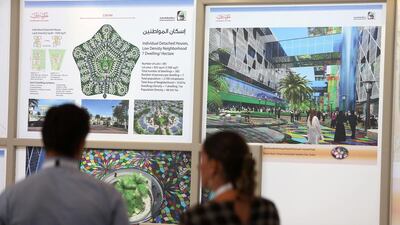DUBAI // Dubai and San Francisco are working together to share ideas about policies and practices of “smart cities” to promote innovation and overcome challenges.
The two metropolises started the collaboration earlier this year, according to experts and officials at the Smart Living City conference in Dubai on Monday.
Plans to turn Dubai into a smart city – one characterised by investments in technology and human capital, plus a high quality of life – were announced last October by Sheikh Mohammed bin Rashid, Vice President and Ruler of Dubai. Among the plans are a parking app and public Wifi.
Achieving the smart city goal would promote sustainable growth, better city management and other improvements, but requires the Government, businesses and the public to work together, said Sultan bin Saeed Al Mansoori, Minister of Economy.
“To achieve this synergy, we need to work together to redefine our city in a system that promotes sustainability and a better quality of life,” Mr Al Mansoori said.
Students and entrepreneurs could be invited to work with governments to create new services such as smartphone apps, that are characteristic of smart cities, said experts from San Francisco.
While a top-down approach to policy making can hasten change, many innovations must be market-driven, coming from the citizens, said Mark Chandler, director of the San Francisco Mayor’s Office of International Trade and Commerce.
Examples are transport companies Lyft and Uber – which allow people to use their own cars as taxis – and website Airbnb, through which people rent out their homes like hotel rooms.
“No government would have ever come up with Uber or Airbnb,” said Mr Chandler. “The market has demanded this. It’s incredibly popular.”
While these companies have created policy issues and questions about regulation, they have also improved efficiency and lowered carbon emissions, he added.
“If you’re going to be a smart city, you have to accept these technologies,” said Mr Chandler.
Allowing the private sector to use government data is another crucial part of becoming a smart city – but also another challenge in a country where many feel concerned about privacy and security, the conference heard.
While government institutions in San Francisco were initially sceptical about opening up data to the public, officials soon realised that it “actually was incredibly inclusive”, said Peter Hirshberg, chairman of the City Innovate Foundation, an organisation that promotes economic development.
One service that emerged from open data was an application that connected artists and building owners to allow them to promote public art, and so deter graffiti.
In Singapore, once data analysts and entrepreneurs were given access to the city’s taxi traffic data, they realised they could reduce taxi use by 20 per cent if they allowed ride sharing, said Mr Hirshberg. An app was then created to facilitate that.
Despite the three-year deadline set for becoming a smart city, Dubai’s advantages lie in its diversity, location and the leadership’s desire to make changes, said Mr Chandler.
“One of Dubai’s great positives is that they have a population that’s ready for it,” he said.
Dubai faces the unique challenge of having a tech-savvy government, while the private sector and academic institutions need to catch up, said Mansoor Al Awar, chancellor of Hamdan bin Mohammed Smart University.
One obstacle is that academics in the Arab world tend to avoid working closely with businesses.
“The problem is that so far in the Arab world overall, universities and academic institutions are not so active in this,” he said.
This can make universities less innovative than in other parts of the world.
“They are very reluctant to do something [new], and if they fail, when they fail once, they ... move on to go back to their comfort zone, which is academia and teaching,” said Mr Al Awar.
Bridging the gap between the two sectors requires a paradigm shift as well as academics’ willingness to “make certain concessions”, welcoming entrepreneurs to work directly with students.
“Every talent needs education and training to become a talent,” he said.
lcarroll@thenational.ae

